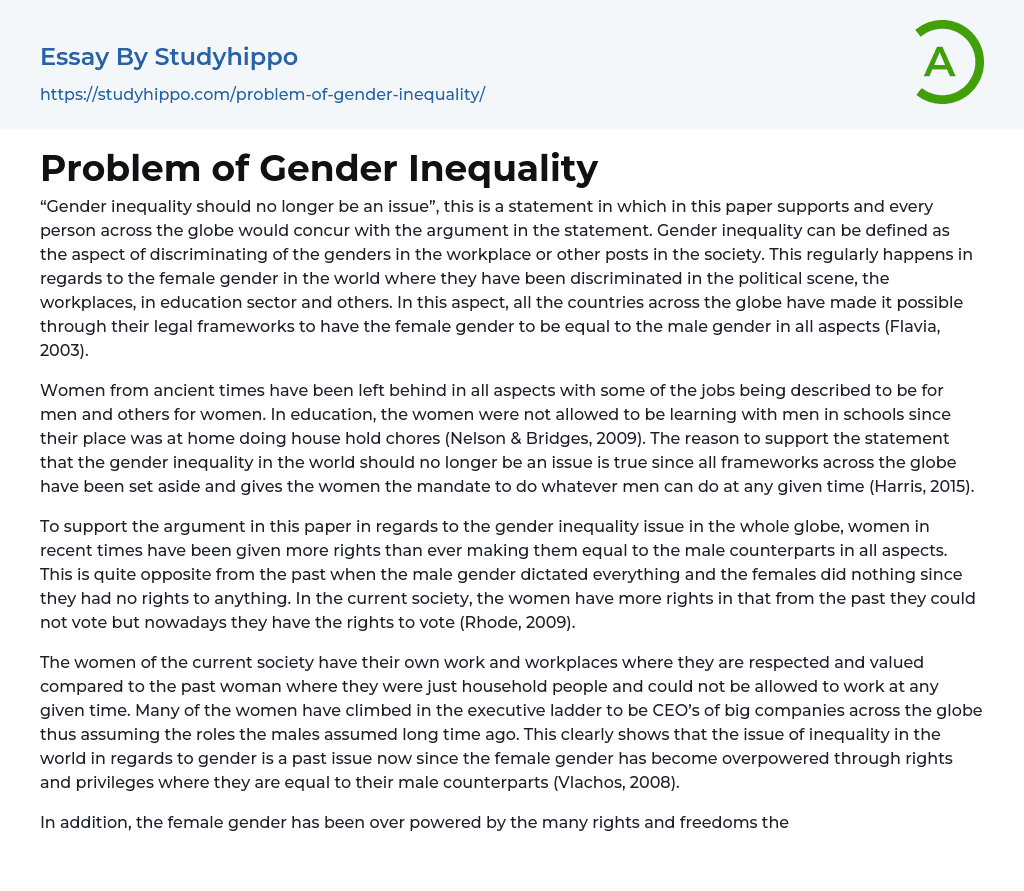“Gender inequality should no longer be an issue”, this is a statement in which in this paper supports and every person across the globe would concur with the argument in the statement. Gender inequality can be defined as the aspect of discriminating of the genders in the workplace or other posts in the society. This regularly happens in regards to the female gender in the world where they have been discriminated in the political scene, the workplaces, in education sector and others. In this aspect, all the countries across the globe have made it possible through their legal frameworks to have the female gender to be equal to the male gender in all aspects (Flavia, 2003).
Women from ancient times have been left behind in all aspects with some of the jobs being described to
...be for men and others for women. In education, the women were not allowed to be learning with men in schools since their place was at home doing house hold chores (Nelson & Bridges, 2009). The reason to support the statement that the gender inequality in the world should no longer be an issue is true since all frameworks across the globe have been set aside and gives the women the mandate to do whatever men can do at any given time (Harris, 2015).
To support the argument in this paper in regards to the gender inequality issue in the whole globe, women in recent times have been given more rights than ever making them equal to the male counterparts in all aspects. This is quite opposite from the past when the male gender dictated everything and the females did nothing sinc
they had no rights to anything. In the current society, the women have more rights in that from the past they could not vote but nowadays they have the rights to vote (Rhode, 2009).
The women of the current society have their own work and workplaces where they are respected and valued compared to the past woman where they were just household people and could not be allowed to work at any given time. Many of the women have climbed in the executive ladder to be CEO’s of big companies across the globe thus assuming the roles the males assumed long time ago. This clearly shows that the issue of inequality in the world in regards to gender is a past issue now since the female gender has become overpowered through rights and privileges where they are equal to their male counterparts (Vlachos, 2008).
In addition, the female gender has been over powered by the many rights and freedoms they have been given to match the males. The issue of the right to education and other rights has empowered the woman in the current society to an extent that they are almost bypassing the males in the society (Scott & Lyonette, 2010). It is for sure that in the past society the women were not allowed to contest in any of the political posts across the globe and in any country.
Recently, the woman has been empowered in a manner that the world is having a sensation in regards to the political scene with various countries electing the women as their presidents a thing that had not being experienced from the past. This is due to the fact
that gender inequality is no longer an issue in the world to bother people at any level. Therefore, the paper supports the idea that gender inequality should no longer ne an issue across the globe due to the steps taken by all stakeholders to instill gender equality in the current society (Nelson, 2009).
References
- Flavia, A. (2003). Law and gender inequality: The politics of women's rights in India. Delhi: Oxford University Press.
- Harris, D. A., Giuffre, P., & Project Muse. (2015). Taking the heat: Women chefs and gender inequality in the professional kitchen. New Brunswick, New Jersey: Rutgers University Press.
- Nelson, R. L., & Bridges, W. P. (2009). Legalizing gender inequality: Courts, markets, and unequal pay for women in America. Cambridge u.a.: Cambridge University Press.
- Rhode, D. L. (2009). Speaking of sex: The denial of gender inequality. Cambridge, Mass: Harvard University Press.
- Scott, J. L., Crompton, R., & Lyonette, C. (2010). Gender inequalities in the 21st century: New barriers and continuing constraints. Cheltenham: Edward Elgar.
- Vlachos, A. (2008). Girls don't surf: The gender inequality of women surfers.
- Gender Inequality In The Workplace essays
- Equality essays
- Gender equality essays
- Gender Inequality essays
- Minority essays
- Segregation essays
- Social Inequality essays
- Boy essays
- Gay essays
- Gender essays
- Gender Identity essays
- Gender Roles In Society essays
- Gender Stereotypes essays
- Girl essays
- Homosexuality essays
- Human Sexual Behavior essays
- Lgbt essays
- Man essays
- Masculinity essays
- Sexual Orientation essays
- Transgender essays
- Woman essays




